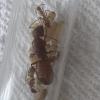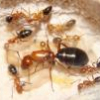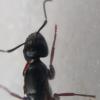Aquaexploder (provided they survive things are a bit hairy)
Are your P. imparis ok?

Aquaexploder (provided they survive things are a bit hairy)
Aquaexploder the book is also available on google play books for like 10 bucks. Plus side to that is you always have it around for reference and it's searchable. The Identification keys will likely be useful to have around.
I'm pretty good with my winter ants for now (provided they survive things are a bit hairy), but come next year it might help me narrow down some sppts for some pheidole.
haha I did both ![]() I got the Google books version of it first using the Google Rewards ("free") money, then bought the book later once I realized I like it.
I got the Google books version of it first using the Google Rewards ("free") money, then bought the book later once I realized I like it.
I have an established A. Picea colony
I have an established A. Picea colony
I have recently found a queen of this species. Could you please give me care tips?
There is a care sheet on this species on this site. I recently found one also. Any additional tips are welcome.
MYRMICA?! OMG I NEED THEM
I'm getting my collecting equipment ready...Also, I just caught an adorable Lasius latipes queen. She got attacked by her L. alienus workers, so I put a drop of honey on her thorax and sent her back in. The workers drank the honey off and fed it to the queen! She was successfully adopted.
lol!!! good luck with collecting queens ![]() . I will trade any with you that I happen to come across. Btw, I have never heard of anyone introducing a social parasite queen to host workers like that. Again, you need to share some of these tricks (including AI) with the rest of us in some sort of post!!!
. I will trade any with you that I happen to come across. Btw, I have never heard of anyone introducing a social parasite queen to host workers like that. Again, you need to share some of these tricks (including AI) with the rest of us in some sort of post!!!
I found another Aphaenogaster dealate today. Also as I asked previously, do we have any fungus growers in New England?
Trachymyrmex septentrionalis can be found in Rhode Island.
I found another Aphaenogaster dealate today. Also as I asked previously, do we have any fungus growers in New England?
Trachymyrmex septentrionalis can be found in Rhode Island.
Really? I thought their range stopped in Northern NJ. Is there any literature mentioning they can be found even farther North?
I found another Aphaenogaster dealate today. Also as I asked previously, do we have any fungus growers in New England?
Trachymyrmex septentrionalis can be found in Rhode Island.
Really? I thought their range stopped in Northern NJ. Is there any literature mentioning they can be found even farther North?
There is a scientist at Uconn who gathers laboratory colonies from RI. I believe his name is Professor Classen (I think that is how it is spelled). I met up with him once, but it was a long time ago.
There is a scientist at Uconn who gathers laboratory colonies from RI. I believe his name is Professor Classen (I think that is how it is spelled). I met up with him once, but it was a long time ago.
Guess who's hunting/getting a fungus grower next year!!!! --> This Guy <-- :-D
I've seen reports of them illinois . They're colder than most of southern new england. I aslo read they are found on long island, so southern CT and Block Island and the coast are possibilities. They apparently prefer entirely sandy soil conditions in open areas like pine barrens. Southern MA, the cape and Islands could also be strong possibilities. Oh and their nest is apparently very unique and unlikely to be confused with other species! Now we need a nuptial flight range!
I do recall as a child seeing ants carrying leaves while out playing in the woods/swamp. Probably unrealated but....
http://eol.org/pages/614221/details
Edited by RhodyAnts, August 16 2017 - 5:31 PM.
There is a scientist at Uconn who gathers laboratory colonies from RI. I believe his name is Professor Classen (I think that is how it is spelled). I met up with him once, but it was a long time ago.
How did you meet him? Just curious because I might want to meet him.
I was meeting with another Myrmecologist by the name of Eldridge Adams to talk with him about his research / career and to get a tour of his laboratory, which happened to be located next to professor Klassen's office. He was extremely friendly and informative. He even gave me a tour of his office and of his laboratory colonies as well!
Thanks, this is the guy. Sorry for botching up his name btw.
I shall search for Trachymyrmex in my region now. (I'm feeling unnecessarily eloquent)
Also, I finally caught my Connecticut white whale (a myrmecophile!). It died, but still.
Can you guys guess what it is?
Ants & Myrmecology →
General →
Want to connect with other ant keepers in MaineStarted by Naturenut1233 , Mar 29 2024 |
|

|
||
Market Place →
General Market Place →
Ottercl's Ant Shop (Massachusetts)Started by Ottercl , Aug 4 2023 |
|

|
||
Anting →
Ant ID Requests →
Can anyone identify which ant this is?Started by KodexFB , Sep 26 2022 |
|

|
||
Ant Keeping →
General Ant Keeping →
Can anyone identify which ant this is?Started by KodexFB , Sep 26 2022 |
|

|
||
Market Place →
General Market Place →
Looking to buy Queens/Already built colony's in CTStarted by OliverO , Nov 11 2021 |
|

|
0 members, 0 guests, 0 anonymous users